#Gravity Falls meta
Explore tagged Tumblr posts
Text
I want to talk about Stan's eyepatch for a second

Obviously, it's a stylistic choice - part of the Mr. Mystery outfit and gimmick.
But did you know that eyepatches, historically, had a practical use too? Even for those with two good eyes, especially sailors.
We've all been the situation where you turn your light off for the night, and it takes your eyes a few minutes to adjust to the dark before you can see around your room.
Well sailors who had to go from the bright, sunny deck of the ship down to the dark hull to grab something, didn't have time to let their eyes adjust. So they'd wear an eyepatch over one eye while outside, and then switch it to the other eye as they went below deck so they could see clearly right away.
Well I think Stan knew this, especially considering his fascination with sailing. And while we mostly think of Stan working in the basement at night or early in the morning, it's possible that he could have needed, occasionally, to check on some process or something down there in the middle of the day.
"Soos, Wendy, go grab lunch, I'll watch the store" and he'd lock the door and quickly go check on whatever it is. And the eyepatch is just easier to keep on him than a flashlight, and arouses less suspicion too.
I mean, in the screencap above, he couldn't be bothered to even get dressed, but still chose to wear his eyepatch. And it's something he only wears occasionally anyway.
I don't think this is something the writers included intentionally, just a little headcanon of mine :) stan is so cool
126 notes
·
View notes
Text
This is mostly just a HC, but judging by all the evidence given in canon, I'd be willing to bet that Stanley Pines has no middle name.
Think about it - it's basically confirmed that the Stan Twins were not planned, and their parents (namely Filbrick) for one reason or another, couldn't be bothered to come up with a different and/or meaningful name for their second baby, so they both essentially ended up being named 'Stan.' Now, we know Ford's full name is 'Stanford Filbrick Pines.' My guess is that's because he was the baby they knew about when they found out that Caryn was pregnant. Stanley, on the other hand, they did not know about until he showed up 15 minutes after his brother, lol. Therefore, it stands to reason that no one put any effort into giving him a middle name.
As if Stan needed any MORE angst piled onto his backstory... 🥺
#you gotta scroll down to the 'cryptograms' section of the page i linked up there to see the decrypted bit of canon info i referenced#just fyi lol#gravity falls#gravity falls headcanons#gravity falls meta#stanley pines#stan pines#grunkle stan#filbrick pines#gravity falls filbrick#my posts
82 notes
·
View notes
Text
Honestly the most revolutionary thing about Gravity Falls to me is its commitment to sincerity.
I’ve been listening to Alex’s podcast where he goes into the details of each episode with different storyboard artists and writers who worked on the show, and it just baffles me how… cared for the story is. Right now in media there’s been an uptick in satire, and shows making fun of themselves for existing, or taking the piss at their own content to “win” fans to their side. It’s like whimsy is gone from so many pieces of media. But Gravity Falls just doesn’t… do that. It completely embraces itself. Weirdness and all. And so does the team behind it. I’m not used to something I care about being so cared about by everyone surrounding it.
Here’s this cartoon, written and illustrated by an entire team of people saying, “no, we’re serious. we mean this. we made this on purpose and we made it important.”
Throughout the podcast, Alex discusses little ins and outs of each character, offering so much deep internal struggles and enriching the story even farther. And listening to him unpack it with the utmost sincerity just warms my heart. Each character is so dynamic because they were cared for by people who imbued them with sincerity.
That’s exactly why we get quotes like “Shame is powerful, but it grows in the dark,” as Ford realizes the trauma he’s hidden for so long is being embraced by his family, diminishing it’s weight on him through their immediate support.
It’s why we get Alex describing Stanley with quotes like; “I always in my gut thought of him as somebody with a huge well of sadness, a loss of human connection. And that need to please? That need to get laughs from the crowd, and putting on a big show? He’s trying to get from them the affection he never got from his family, and that he lost with his brother.”
Or detailing how Mabel might be a goof… but half the time she’s doing a bit, because she’s really more mature than her brother and doesn’t want him to grow up too fast. She’s trying to help ground him and bring lightheartedness into his life. Because she knows otherwise, he’ll become too self isolated.
And those two mini character studies he dropped so casually in these podcast episodes just… color the show. It’s why the show survived so well even after ten years. It’s gruff-old Stan always calling his niece “Pumpkin” and “Honey”. It’s the family always holding hands without it behind laced with a joke, and falling asleep on one another in the car. It’s Alex explaining that people toyed with other endings, other plot lines, other twists, but it was always going to end with Stan and Ford mending the family tie they severed thirty years ago. Because that was their story. Messes and family and care.
Ten years ago, watching it for the first time as it came out, I felt all that. But now, as an adult, knowing that all the other adults who made it felt the exact same way? :,) What a special story we all got to grow up with, and get to continue being apart of.
#gravity falls#the pines family#pines twins#gravity falls meta#gosh i’ll never stop loving this show#stanford pines#stanley pines#dipper pines#mable pines#roseys musings
6K notes
·
View notes
Text
No idea how I forgot to make this post when the website first came out, but Bill's sheer, burning hatred for Stan has such goddamn delectable levels to it, hardly just limited to anger that Stan defeated him. First is the fact that in Bill's eye, he wasn't just defeated, but out-conned by an inferior con man, hustled by a second-fiddle hustler — and what an unthinkable threat to Bill's pride, what a gallon of gasoline to pour on the fire of his rage and contempt! Bill can't shut up about how stupid he thinks Stan's cons and schemes are. But you know what else Bill is furious about? What seething lines he drops, right before the culmination of his breakdown?

[ID from alt: excerpt from the website, reading: "And Lucky Stan- the roll's on black, He got his life and family back. His big break, it finally came, Redemption from a life of shame." End ID.]
Luck. After all Stan's failures, luck, at least in Bill's eyes. The luck of the roll, to get his family back.
Bill fled his ruined home, taking with him his father's hat. Bill treated truth as whatever sold. But. Bill didn't get his family back.
And now? As helpless as Bill is, he refuses to admit it. He refuses to accept that Stan won. That Stan gets to be happy. Because there is no one that Bill more desperately wants to make burn than the person so infuriatingly similar to him, yet so obviously inferior... who nevertheless, despite it all, got exactly what Bill couldn't.
#gravity falls#gravity falls meta#the book of bill#thisisnotawebsitedotcom#bill cipher#stanley pines#the book of bill spoilers#gf spoilers
3K notes
·
View notes
Text
sigh, today i'm thinking about ford settling back into the lab after he first comes home, and seeing the proof of how hard stan worked to bring him home


stan was always the "dumb one" between them, always riding on ford's coat tails and slacking off. but he was able to do, on his own, without help from anyone, what it took ford 12 phds, fiddleford's help, and bill's guidance to do. just based off of ONE of ford's cryptic journals and whatever scattered notes and blueprints he was able to find, all while having never graduated high school.
ford having to confront how hard stan worked, how far he pushed himself, how smart he actually is
EDIT: also, stan only had journal 1, that's NOT the one he was working with bill in! that's his first few years in gravity falls, when ford was just as ignorant as stan was! there probably isn't a lot for stan to work with in there.
#this is not a ground breaking post and i know it#but this is whats on my mind this morning#gravity falls#gravity falls meta
1K notes
·
View notes
Text
genuienly adore that the era of gravity falls meta is back, and like... i'm thinking again about just how mad bill is that stan beat him, and the really extreme lengths he's going to right now to affirm his belief that stan is worthless and nothing and doesn't matter
because like, yes, stanley tricked you, and that's a blow to the ego when you clearly only saw one of the stan twins as having any intelligence at all
but like the other thing about that moment, of the twins swapping outfits, is bill has the ability to read minds
he's not someone who should be able to be tricked like that at all!
the only exception, the person whose mind he can't read, is ford's, bc ford bill-proofed his own head
if bill had done even the bare minimum of checking before agreeing to that deal, he would have easily been able to tell which stan was which
but he didn't try to read stan-dressed-as-ford's mind, because he assumed he wouldn't be able to, and he doesn't need to to understand ford anyway
and he didn't try to read ford-dressed-as-stan's mind, because he assumed there was absolutely nothing in stan's head that could ever pose a threat to him
so of course you're trying to prove that stan is truly worthless, because it's the only thing that justifies the colossal mistake you just made
(and i do think it's fun that bill knows how to manipulate ford, or dipper, or mabel, we've seen him do all three, but despite the fact that bill has literally been in stan's head, he keeps reminding us of that fact, stan is the one person he will never understand)
#gravity falls#gravity falls meta#stanley pines#stanford pines#bill cipher#thisisnotawebsitedotcom#the book of bill
3K notes
·
View notes
Text
Been thinking about how Bill legitimately had a horrifying reason (the literal progressive disintegration of the nightmare realm that erases whatever it disintegrates from existence completely) to move himself and his crew into a new dimension. Like that's terrifying. And yet he never utilizes this to his favour. He could have been honest about this with Ford, and you KNOW as long as Bill didn't mention plans of overtaking the earth, Ford would've made the portal for him, both out of Ford's own interest and because Ford when faced with these big moral questions will pull through. But this is a card Bill NEVER plays because although he needs to leave the dimension, he cannot lose face. He can't put aside his pride and admit to the humility that he needs to flee from his dimension, that he's not actually all powerful. And so instead he pretends to be a muse and when Ford figures out something else is going on, instead of being open and humble and saying that his dimension is unravelling, Bill focuses on that he's going to over take earth, that he's actually been a monster all along, surprise Ford!
And part of it is definitely because Bill's built himself up on power and violence and to grovel and earnestly ask for help, to admit that he cannot stop the unraveling of his dimension completely invalidates that; showing vulnerability? Can't do that, even under the guise of lying to get his way. And part of it makes you wonder if it's also a form of self-sabotage, because underneath his deep denial Bill is guilty over what he occurred; he sees himself as a monster and so he'll be that monster, and having people recognize that feels good in the same way that pressing a bruise feels good. But it makes you wonder what would've happened if Bill even just was open about his dimension unravelling and had lied about overtaking the earth.
It's also interesting because although Bill has SOME charisma and can manipulate people decently well (as evidenced by his cult, and pandering to people's desires with Ford, Mabel and Blendin), he refuses to be vulnerable, refuses to not be true to his off-putting self, even when if he was just vulnerable of pretended to not be himself, to put aside the (false) pride he has in himself he would've gotten a portal by now. and part of me wonders if it's because it's this false pride that built on insecurity and denial on who he is he cannot drop that mask.
Further thoughts on this!
#hugin rambles#hugin rambles gf#uhhhh yeah anyways Bills a delightfully complex character#and I think thats why also Bill fell hard for Ford is because Ford was vulnerable with Bill and actually CARED for Bill and got to peer#into the vulnerable bits of Bill and cared for him#but yeah fascinating. rotating him in my head whooo#bill cipher#billford#the book of bill#TBOB#gravity falls#but seriously the idea of Bill becoming honest with Ford instead of being like HAHA I TRICKED YOU bounces around the ol noodle with vigor#like dude thats a HUGELY typical self sabotage thing. like why YES im what people think i am.#hes interesting because hes good at manipulation. but also at the same time bad at it because he refuses to not be himself.#which... yanno i can respect. truth to being yourself even if thats offputting and annoying. but certainly makes it more difficult#re: manipulation. and then there was ford who was just. really into Bill in entirety#congrats! you guys match each others freak and toxic neediness to the t#gravity falls meta
930 notes
·
View notes
Text
a note on "fordtramine"
just a thought while im working on a comprehensive history of bill.
by now i'm sure it's common knowledge that stanford's favourite colour is "fordtramarine", a colour only him and bill are able to see due to bill rewiring his optic nerve as a gift, but something i find very interesting is this page from thisisnotawebsitedotcom.com

specifically, that note at the bottom on the "beautiful" paintings ford submitted to (unsuccessfully) demonstrate the colour. most of them are normal, including a self portrait in gouache until you get to "(E) A muse, oil on canvas".
not only that, but in the abstract ford writes that "specific two dimensional entities may act in the same way as a prism, refracting light.... new perceptions"
something something devoting a painting to your muse in the colour that they let you name, that they gifted you with the ability to see. something something bill acting as a prism, like the crystals ford keeps all over his house, that ford can look through, like a doorway into a world entirely made of the weird and wonderful that you connect so deeply with. a world that you can never show anyone else, your canvases are always blank and no-one else has the eyes that you do, your study is rejected and no-one will hear you out.
do you think bill felt that way? growing up, able to see what others couldn't, "its not your fault you have that strange eye", "the doctor says three sips a day will make the visions go away", able to see an entirely different dimension to his own parents, always too different and too strange and too weird.

CODES: "THEY'LL SEE" "THEY'LL ALL SEE" "THE EUCLYDIAN DEPT OF VISION SUPERVISION"
growing up in a world where it seems that seeing beyond the norm is heavily punished, it's kind of telling that bill's gifts to ford are often relating to seeing or knowing things that ford would never experience without bill (new colours, new directions for his research, his mindscape, the portal). the gift of vision from a god who grew up being blinded. bill really is his all-seeing eye, in a lot of ways.
in the same way, fiddleford's gifts to ford almost always revolve around very human comfort (gloves to fit his hands specifically, a pet to keep him company, a snowglobe reminder of the time they spent together) comfort that he was too distracted to devote to his wife and child, only ever to ford who broke or threw them away.
fiddleford accepted ford for who he was, and he showed that through his gifts. all of ford's strangeness and brilliance, gloves made specifically to protect and warm six fingers, a pet that looked like him for him to ramble to when fidd is gone. bill's gifts were brilliant and tailored just for ford, but they were isolating. experiences he could only have with bill, things that made him stranger, more alone, pulled him further into the weirdness, the grey area. all in preparation for the day bill would take things too far, and pray ford, so alike to him, would join him.
#eden rambles#gravity falls#thisisnotawebsitedotcom#billford#fiddauthor#bill cipher#stanford pines#gravity falls meta
812 notes
·
View notes
Text
Ford’s love for & view of Stan pre-memory erasing: a lengthy analysis
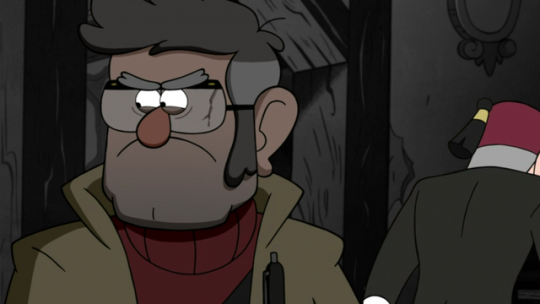
A big misunderstanding going on in this fandom is the idea that Stan was the one yearning for Ford while Ford was too busy hating Stan (at worst) or at least thinking he hated Stan (at best), too focused on his research and academic accomplishments to pay his repressed/heavily denied love for Stan any mind, up until Stan���s sacrifice in Weirdmaggedon. Ambitious, self-centered Ford, who would be shocked at the preposterous idea that he still loved Stan deep down if, say, his post-Weirdmaggedon future self revealed it to him. “I thought I hated you, but I was wrong,” old Ford says to Stan, remorseful... and painfully out-of-character!
Another very popular idea is that Ford genuinely values the greater good over Stan, to the point he wouldn’t have rescued Stan if their positions were reversed. This idea is so rooted in people’s minds that when Ford’s most dedicated fans attempt to defend him, they argue that he was right to be angry about being rescued from the portal because Stan was acting irresponsibly (as if Ford wouldn’t have done the same thing). This is not about anyone in particular—it’s a tendency I’ve seen repeated again and again and again, in different ages of this fandom.
The gap between Stan needing Ford vs Ford needing Stan is so big in some people’s minds that they seem to think that poor, guilty Ford ending up with Stan all alone on a boat wasn’t the best ending for him. That was just Alex trying to make a point about “family above all” in a show about family, teaching Ford a lesson, and rewarding Stan’s unhealthy codependency...
It’s just incredible how Ford’s own love and yearning towards Stan is shoved under the rug by the fans!
I understand why, of course. Ford is arguably the most complex character in Gravity Falls. His love for Stan is shown more subtly than Stan’s love for him. You have to actually pay close attention, and often enough people aren’t invested enough in the Stan twins’ relationship to do so. Sometimes because they’re more invested in the relationship of Stan and/or Ford with other characters, and this is not throwing shade, either—on my part, I can admit I am so invested in them that I don’t care as much for other characters, and that’s natural.
My most controversial takes here are: 1) Ford has always known he loved Stan. Yes, even at his most bitter. He just didn’t think Stan was worthy of that love. 2) Ford valued his family, including Stan, over any noble ideal of greater good. 3) Ford missed Stan and yearned for his company just as much as Stan missed Ford and yearned for his company. I have dedicated this particular meta to pointing out not all moments (that would make it longer than Tolstoy’s War and Peace, just by the amount of times Ford mentions Stan in his journal) but the most telling ones re: Ford’s repressed but obvious love for Stan and their implications. I’ll break it into a few different subjects that I believe drive my point across.
Ford’s sentimentality over Stan:
A good place to start as any. Stan is in literally everything Ford does, sometimes in ways so subtle that people miss it, and in ways that Ford himself would love to deny, even if it meant lying to himself. Ford is very, very sentimental, and that is reflected in his relationship with Stan through the decades, with all the different paths he takes to cling to his past and the idea of his brother.
Let’s explore some examples, shall we? We don’t need to go far.
First of all, the Mystery Shack cottage, commissioned by Ford and built by Dan Corduroy according to Journal 3, is clearly based off a childhood toy he shared with Stan.
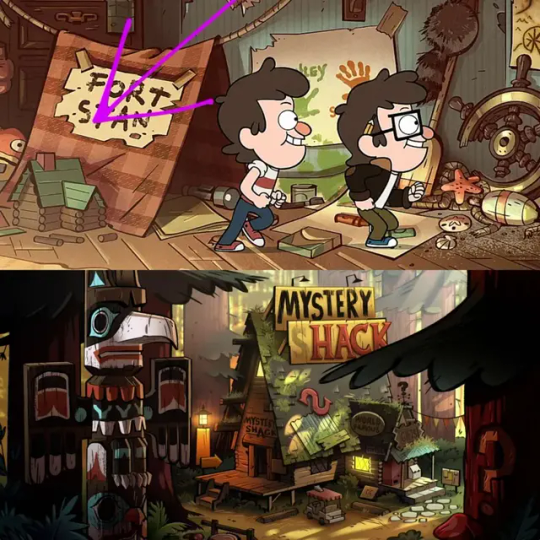
It doesn’t stop there, of course. Ford loves his boat motif decorations. (At least the boat on top of the shelf is very likely Ford’s choice of décor, and not Stan’s, given that it’s placed beside Ford’s shrunken heads referenced in Journal 3; we know that the boat painting belongs to one of the Stan twins and not Dipper, since it was already there in Tourist Trapped as Dipper arrives. I think it’s fair to assume, given the boat on top of the shelf, that it was also Ford’s.)
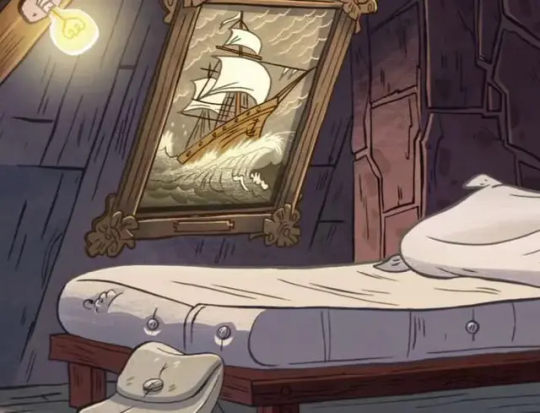

And would you look at that, his favorite place in his beloved Gravity Falls, a town full of wondrous places full of fantastical anomalies and literally a weirdness magnet, is, for some reason, a lake. A very weird lake? A very cool lake? No, a lake that reminded him of his childhood, aka Stan (as seen by the drawing of a boat and the codified message). “There is no other place in Gravity Falls I would rather be than the lake.”

But that isn’t enough for Ford. He must keep, still, pictures and videos of Stan. I won’t even focus, here, on the picture of the Pines family that Ford stares at in the beginning of his college days, despite Stan and Ford being at the very center of it and it being a visual parallel to Stan’s own picture of him and his brother. That one included Filbrick and Caryn, and the speaker had just mentioned making one’s family proud. But what about the rest?
People usually focus on the overall adorableness of, say, Ford leaning his head on Stan’s shoulders or Ford’s apologies (again, in Journal 3) to notice the implications of what Dipper says: “Ford even found an old film reel of them as kids, which he amazingly saved all these years.” Even Dipper himself is amazed. I’ve seen people assuming that Ford had these and forgot about them, or that Caryn was the one to send him these and he simply agreed to avoid a fight (there is a tendency in this fandom to think of her as a very loving and/or affectionate mother, but we have no evidence to think so). Years later, TBoB was like, “nuh-uh, that was all Ford Pines!” In TBoB, Ford not only does remember some of these itens, but he makes a conscious effort to hide them from Fiddleford, worried that his friend was getting “too close” (to what? to the inner depths of his heart and mind, where Stanley was?) “I’ve quickly re-hidden here, away from prying eyes.”
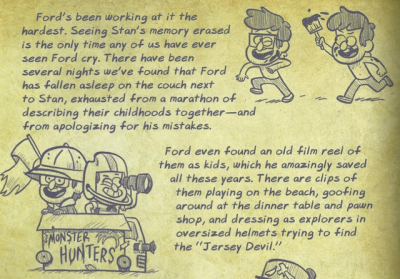
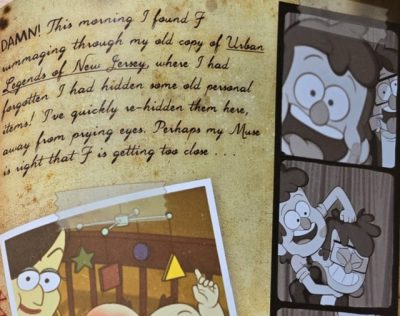
And a picture of teenage Stan (as seen below), too! You would think he would just attach himself to the idealized version of baby Stan in his head to feed his nostalgia and completely ignore teenage Stan, the traitor, the one who destroyed his science project. But no, Ford wouldn’t be Ford if he acted consistently about Stan. The funniest thing to me about the ripped yearbook page is that it implies Ford made the conscious decision to include Stan as he ripped the page off, when he could have just focused on his own picture. And then we also have his drawing of Stan, a perfectly accurate portrayal of Stan’s face as he got kicked out, implying that not only he paid an enormous amount of attention to his brother and how he looked like back then (after he closed the curtains), but that particular image was living rent free in his brain. Very vividly. With details.
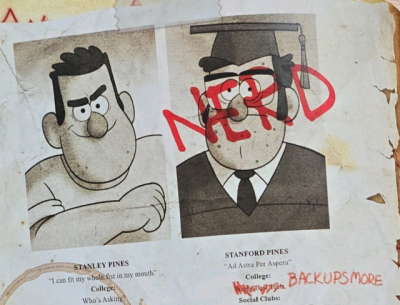
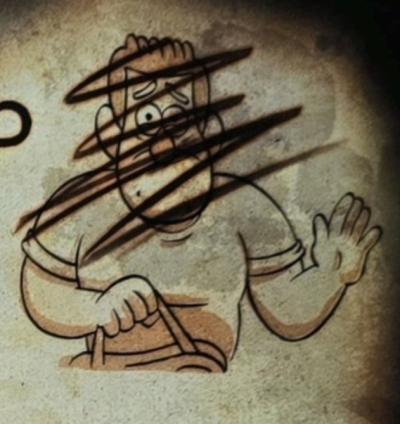
Now, folks, do we have any doubt whatsoever of the power Stan had in Ford’s psyche? Seeing that this is how the bedrock of Ford’s mind looked like? The boat, the swing set? I’ve seen it suggested before that these items represent Ford’s greatest regrets—I don’t know if I fully agree with that take, seeing as the swing set is fully intact, unlike in Stan’s mind, but one thing is true: they represent what Ford deep down thinks is most important, and two of three are directly related to Stan. Even the portal, from a certain angle, is connected to Stan.

Now, another thing that I believe to be related to that, is the claim that Ford didn’t spare Stan a single tought in the many decades they went separated. But here is Ford, casually confessing that he spent the last thirty years thinking of Stan:

But back to pictures. According to Alex in the commentary of Weirdmaggedon 3: Take Back the Falls, that picture of Stan has always been in Ford’s coat pocket, through all the decades, even before Bill’s betrayal. That’s why it’s so damaged. He was dimension hopping with it. I don’t think I even need to make any comment here, hahah.
I almost imagine if McGucket found that photo in his, you know, coat while they’re working on the portal or something... [imitating Fiddleford’s creaky voice] “What’s this? What’s this here?” And Ford says, [imitating Ford’s deep, very serious voice] “OH, yes. That’s a very important moment, that’s when I, um, first decided I wanted to be an adventurer.” [...] There would be NO reference to... the real reason he’s keeping it [...]. “Oh yes, this is about, uh, science, as a horizon, as a frontier to reach towards. You know, like a boat, like a ship, like science. It’s about SCIENCE!”

Ford’s protectiveness:
Stan Pines is very much ones of Ford’s weaknesses. Ford knows this and accepts this with shocking ease. How so? Well, first of all, the nightmare he had. As he tells us about it in Journal 3, even though he attempts to make light of the situation, his hand is clearly trembling as he writes, making drops of ink splatter on the page. The climax of his nightmare, the peak, the scariest moment was when Ford realized he was not the one at risk; rather, Stan was. “I realized my hand wasn’t chasing after me at all—it was chasing after my brother, and it was going to squeeze him to death!”And then, may it be noticed, there was no hesitation whatsoever on Ford’s part about whether to save Stan or not, nor does he try to hide his protective reaction. It was immediate and instinctive. “I tried to run to help him, but my feet were frozen.” It’s very telling that the Dream Hipster, the nightmare inducing ghost, thought that Stanley Pines would be the most effective thing to make Ford shake in his boots. Not even, say, failing and being ridiculed by other scientists, considering how ambitious he was.

And you know who else has noticed this weakness? Bill Cipher, of course. After psychologically, emotionally, and physically abusing Ford in horrific manners (including but not limited to: forcing him to eat spiders, driving a nail into his hand, and making him wake up on the snowy roof of the Mystery Shack as a symbolic threat of forced suicide), Bill involves Stan, as the grand finale. “But then he crossed a line.” Why was Ford’s brother that line, after everything Ford himself went through? “No. He wouldn’t.” Ford couldn’t even believe Bill’s audacity in involving Stan, even though he very much already knew Bill was as evil as evil could get. Because Bill knew, having free access to Ford’s mind, how terribly important Stan was: the person Ford loved the most in the world, more than himself.

You could still argue, then, that Ford wasn’t very protective of homeless Stan. After all, how could he have allowed his brother to be homeless in the first place?
Simple: he didn’t know. There’s a lot of things about mullet!Stan that Ford didn’t know! From canon, namely TBoB and Journal 3, we can deduce that Ford didn’t think of him as homeless, thought he was doing well for himself, living a well traveled charlatan/adventurer’s life, perhaps even a friend/member of the mob:


As Stan was kicked out, he told Ford (and the rest of the family), “Fine! I can make it on my own! I don’t need you! I don’t need anyone! I’ll make millions and you’ll rue the day you turned your back on me!” The way I see it, Ford took that at face value. Stan didn’t seek Ford out in those ten years, either, presumably out of a mix of pride, shame and self-hatred, so Ford could only assume Stan truly didn’t need him. Despite the many, many crossed out mentions of Stan in Journal 3, I think Ford at least tried to not let his mind linger on thoughts about Stan too much, because that hurt.
In his most recent interview, by HanaHyperfixates and ThatGFFan in 2023/2024, Alex talked about Ford’s issues:
He’s aloof, and distant, and he’s too perfect. And it’s like, “oh! I think he’s also aloof and distant from himself.”
I think he is, uh, deeply deeply hiding from his real feelings about things, because at some point early on, he decided that he could run from hurt by achievement and by creation, and has dug that hole so deep that he has no relationships.
If he sees achievement and creation as distractions from his real feelings, no wonder Stan didn’t get a call (or a postcard) from him earlier.
We also have Ford’s condescending, but protective, attitude towards Stan in TBoB as he considers asking for his help. Condescending protectiveness, if you will:

Notice how Ford briefly looks at Stan when Stan rants about his life:

A very ☹️ face. He’s probably surprised and concerned about what he’s hearing.
And then Stan, unfortunately but understandably, starts insulting/accusing him of selfishness:
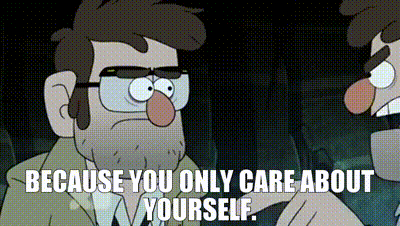
You can notice the ☹️ face slowly becoming 😠 as Stan started attacking.
Again, when Ford accidentally hurts Stan by branding him:
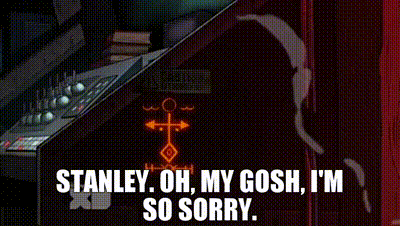
That’s not even ☹️ anymore, it’s almost 😩! Things would probably have deescalated and perhaps even been fixed if Stan, unfortunately but understandably, hadn’t punched Ford in the face as retaliation.
“Oh, but what about old Ford kicking Stan out after everything, then?”
I think a lot of people who talk about this moment operate under the assumption that Stan was, well, completely and thoroughly screwed if Ford followed with his original man. An old man, no place to go, no money...
But Stan did have money. A lot.
No, really, he had, per his own words, in the extra commentary of Land Before Swine:
I do have a son, Benjamin Abe Hamilton Washington. This pile of money I’ve collected over the years! That’s my true family. Y’know, I can sorta glue it together into the shape of a child, maybe… Eh, I dunno. I do my best, right? And I do have—I do actually—not to brag, but I have an obscene amount of money. Uh, y’know, all the years of collecting and etcetera—and also grifting!
I’m not defending Ford’s actions here. Ford is my favorite character, but I’m not a Ford defender, hahah. You could still argue that what he did was an ungrateful, jerky move, and I would agree. I’m just against painting it as a “Ford doesn’t care at all about Stan’s safety” moment. Especially because, when Ford told Stan he wanted his house back, sufficient time had already passed. Enough for Ford to change his clothes, visibly, and enough for them to have had a talk, in which Stan could have revealed this little fact about himself.
Another thing I’d like to address is that Ford doesn’t hesitate at all to save Stan when he gets into trouble and acts natural about it, which is way more that we can say for Stan (as seen by how Stan reacts when Ford is kidnapped by Probabilitor the Annoying and when Ford is turned into a golden statue by Bill):
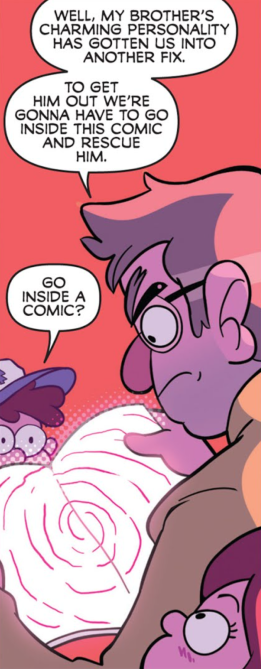
Again, not saying that Stan wasn’t justified in not wanting to help/save Ford after Ford’s blatant ungratefulness (I’m also sure he didn’t know Bill was actually torturing Ford). Not the point.
Now, back to Bill.
What I always loved about his little victory moment in Weirdmaggedon 3: Take Back the Falls is that upon surprising his enemies with his appearance, he proceeds to turn everyone into tapestry, including even Fiddleford (whom we know Ford cares a lot about!) but forces himself to spare Stan and the kids and place them inside the cages, even though they didn’t know the equation and would have zero usefulness to him. That could only be because he thought he could use them against Ford, so Stan was obviously included (instead of turned into tapestry or outright killed) for that very purpose. From a Doylist perspective, of course they couldn’t have excluded Stan, since he was one of the main characters; for the sake of character analysis, though, this is the best explanation in-universe.
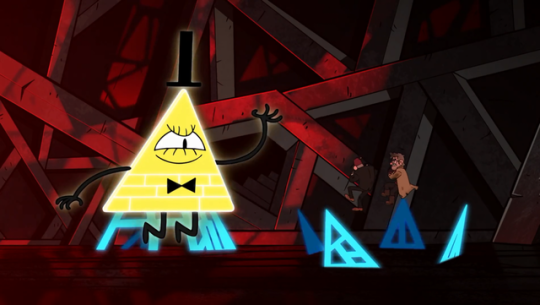
That is why, when Stan-as-Ford tells Bill, “My only condition is that you let my brother and the kids go!” Bill easily believes him. Because he thought that it would be in-character for Ford. And Bill wouldn’t be wrong, not at all. He wouldn’t, because Ford himself was the one to tell Stan, just a moment earlier: “We need to take his deal. It’s the only way he’ll agree to save you and the kids.” It’s blaffling to me how many fans seem to forget Ford’s own words, and the fact Ford was very, very much willing to damn the whole universe (with seven billion people living on Earth at the time) to save three (3) people, including Stan. That Stan himself was the one to oppose and stop him. I think that happens because people buy Ford’s facade of Cold Responsible Greater Good Guy, which couldn’t be more deceiving. At this point I’m begging you guys to look deeper!
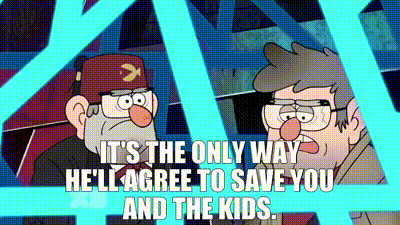
One common misconception about Ford’s character—not only Ford, but many, many fictional characters I have had the pleasure of considering blorbos—is that people take his facade at face value and judge him based off that. You’re falling for his bullshit. You’re looking at Ford and seeing exactly the man he wants you to see, instead of the man he is.
Ford demonstrated being hypocritical many, many times through the show, the comics, his journal, and even TBoB. I would go so far as to say it’s a Known Personality Trait of his. He chews Stan’s ass for being selfish, reckless, a criminal. Then proceeds to be: selfish and completely unaware of it, ten times more reckless, and a much more dangerous kind of criminal. He reproaches Stan for risking the world for only one person, but would have done the same thing.
Now, the last point of this particular subject: Ford and the erasing of Stan’s memories, which is sometimes interpreted as Ford prioritizing the greater good, or the kids’ safety, over Stan.
Dear reader, Ford erased Stan’s memories because he had literally no other choice. This is what Ford said to him: “He’ll be able to take over the galaxy and maybe even worse, but at least he might let the kids free.” Emphasis on the might, here. Might! Perhaps! Maybe! Perchance! Ford, in this line, was referring to Bill’s immediate threat to the kids’ lives—Bill had, after all, ran after Dipper and Mabel with a terrifying threat of disassembling their molecules as their grunkles were forced to watch inside their cage, powerless to stop him. After reflecting about their whole situation, he included Stan’s safety in the deal, too, now more certain than ever about his decision to sacrifice not only himself but, in his own words, “the galaxy” (and later, “the universe,” as he was pretending to be Stan) to, again, perhaps (!!!) save his family. Ford had literally no guarantee Bill would follow through with his words. Given Bill’s track record, it was way, way more likely that he wouldn’t. Bill is a liar and a manipulator through and through, one who takes great enjoyment in people’s suffering. Ford’s suffering, specifically, above all, since TBoB painted Bill as this toxic and possessive ex obsessed with his pet scientist. What were the chances?
Even if Bill, through some miracle, did end up keeping his word, we saw Bill’s plans for Earth in his daydream fantasies: taking a bite off the planet, drawing a smiley face on its surface as millions died... What a guy, that Bill! If the Earth was wrecked beyond repair, where would Stan and the kids live? How would they survive among all the chaos and destruction of the literal apocalypse? With nightmarish creatures lurking in every corner? With what food, what water, what shelter? Answer: they likely wouldn’t. The probability of human survival would be abysmally low.
Ford, tragically, had no other choice but to sacrifice Stan’s memories. It was that or risking the possibility of having to watch his family, including Stan, die horribly painful deaths at Bill’s sadistic hands or to condemn his family, including Stan, to a slower but still certain death after the entire human race perished.
Ford being aware of his love for Stan:
I have faith that most people already knew, to some extent, that Ford never stopped loving Stan, even at his angriest. A much lower percentage of these people, I believe, know that Ford himself was very much aware of that, and not in denial at all. He never even thought he hated Stan.
First, I choose to point out how young adult Ford, still in college, with his bitterness and resentment still very fresh, admits to missing Stan. He wrote, “MISS YOU” in their Bro Code, the code he memorized and never forgot. He not only thought about Stan, which would be understandable, since all of us have intrusive thoughts, but he took the time to write it down, and in code, which would be even more difficult than just writing it in English. That requires at least some level of acceptance. You may not be able to filter your thoughts, but you are able to filter your writing.

Ford does attempt to filter his writing, I know, by crossing out a lot of lines in Journal 3, most of them about Stan. But he does not cross out all of it. He freely admits to having a nightmare about Stan, to wanting to protect Stan from the giant six-fingered hand, to having the lake as his favorite place, to missing Stan. I think that Ford, if asked about his love for Stan back then, would also freely admit to it, as well. Stan is his twin brother, so of course he loves Stan.
One thing that always caught my attention is how Ford still refers to Stan as his “family” in the Journal, even after Stan’s attempt to disown him. Stan makes it pretty clear that, from now on, his “family” is just Mabel and Dipper:
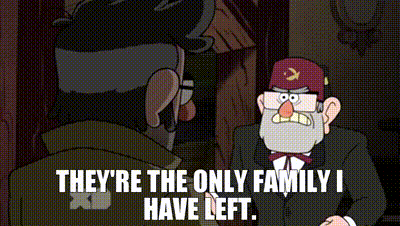
Days after this, Ford didn’t seem to have taken this to heart, as seen by what he wrote in his Journal:

It’s way more likely than not that he IS including Stan, here. He says “the rest of the Pines,” instead of just “the children” or “the kids” or “the twins,” and even singles out Dipper as someone he trusts (contrasted with Stan and Mabel, whom he doesn’t).
I wonder if that’s just Ford being stubborn or if he really thinks his relationship with Stan is in a somewhat better place than it actually is.
I mean, for instance, this is their swingset (symbol of their relationship) in Stan’s mind:
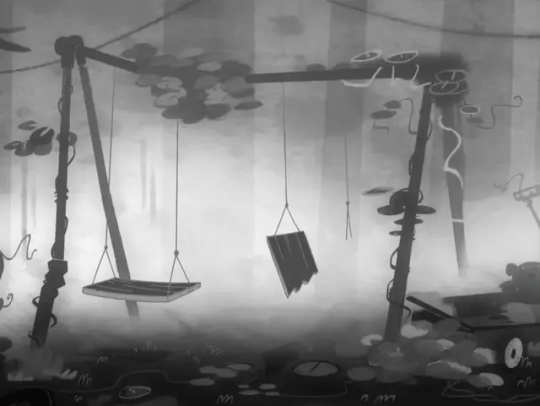
And here it is Ford’s mind:
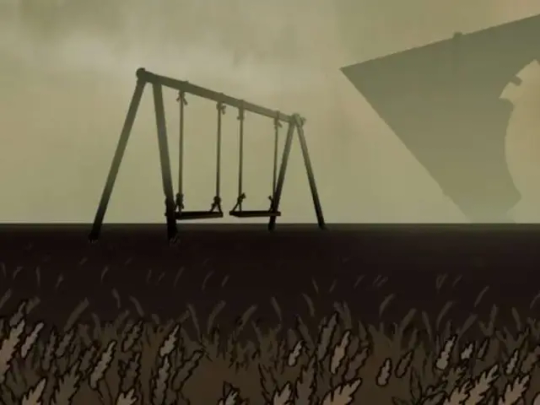
Still ominous, but very noticeably intact.
It’s ironic—I think that Ford was aware of his own love for Stan, but not aware of how damaged their relationship was from Stan’s POV.
Ford and stubborness:
I’ve also seen people saying that, if Stan hadn’t sacrificed himself, Ford would have continued, quote unquote, “hating” him. Or that his happy ending with Stan was a byproduct of his guilt over the same sacrifice, and not out of a genuine desire to reconnect with Stan. According to Alex’s commentary on this scene in Weirdmaggedon 3: Take Back the Falls, that isn’t true, either:
This whole sort of conclusion here is—what we needed to happen in this scene was—we needed pressure to be at the point where Stan and Ford recognize their lifelong rivalry and Ford does a sincere apology to Stan. And almost more importantly, he acknowledges Stan’s intelligence. Like, he says, “you wouldn’t have fallen for Bill’s nonsense,” like, he recognizes his brother has a kind of intelligence that he doesn’t. [...] And even though it’s Stan who agrees to—“I’ll be the one! Erase my mind! It’s fine. It’s worth it.”—like, it’s a sacrifice for both, like, Ford at this point is willing to get his brother back and has to lose him again. Like, both of them were... just doing what they have to do here.
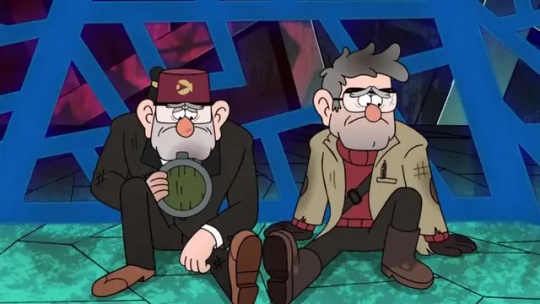
This means that Ford was already wanting to reconnect with Stan before Stan offered to sacrifice his own memories. His comment about how Stan wouldn’t have fallen for Bill’s flattery wasn’t just self-reproach or some comfort to Stan, but a conscious attempt to soften things between them.
Which also means Stan’s offer to sacrifice himself wasn’t actually necessary for Ford to forgive him (or switch the blame entirely, more like, and start blaming himself instead) but just came at the worst possible moment. It was too late for them, now.
Reconciling Ford’s love for Stan with his treatment of Stan:
Now, we arrive at the last problem, which is something I’ve seen a lot of people struggling with. How to even reconcile Ford’s love for Stan, something we see hints of again and again, with his treatment of Stan?
First, this infamous line in Journal 3, which is arguably the most vicious (towards Stan) Ford ever was in canon:

That’s probably also related to Ford’s control freak tendencies. If Ford admits to himself he is not in control, that he needs help from other people, that he is really that desperate... Well, he can’t admit that, so he rationalizes his way out of that conclusion by convincing himself he would be the one doing Stan a favor (offering him the chance to prove himself to Ford), and not the other way around. He doesn’t need Stan, he doesn’t need anyone; Stan is the one who needs him and his forgiveness. (This is the moment I get the urge to reference a manga protagonist with a very similar control freak mindset, Light Yagami from Death Note. Why am I always attracted to characters with deep cogntive dissonance issues who desperately shape their own narrative to convince themselves of their full control over it? Like a moth to a flame.)
Don’t get me wrong, I do believe Ford looked down on Stan—on people in general. There’s plenty of evidence for that in both Journal 3 and Word of God, if you count Word of God as evidence. Ford himself admits to that after Weirdmaggedon. And let’s not forget what is probably the biggest elephant in the room, the 2016 TVInsider interview (if you’re nerdy enough to read such a long meta, you’re likely nerdy enough to have seen this quote already):
In terms of Stan and his brother’s conflict, we always wanted a moment where Ford saw that he was wrong. Ford’s spent an entire life imagining himself as this lone solitary hero and imagining his brother as this bumbling leech. From a narrative point of view, for Ford to see Stan be the hero finally lets Ford see the true side of his brother that he’s been too blinded by pride to see.
Ah, yes. Ford looking down on Stan enough to think of him as a “bumbling leech.” To most people, this sounds way harsher than “selfish jerk,” the term Ford himself used in Journal 3.
Fittingly enough, that was in the same interview Alex said Ford would have deserved to lose Stan:
If Stan had lost his memory for good, that would [have] provided some interesting narrative places for him and his brother to go, but ultimately the show is about the kids. Stan and his brother are meant to be a parable [that show] what can go wrong in a family relationship, [but also] show that, with hard work and sacrifice, the riff can be repaired. If Stan’s memory had been fully erased, it wouldn’t punish him so much because he’d be gone, but it would punish Ford, Dipper and Mabel most. Even though Ford might deserve that punishment, Dipper and Mabel do not.
The interesting thing here, though, is exactly that: losing Stan would be a punishment to Ford. Why? Because it would hurt. Why? Because Ford loved him. Enough, it seems, that he would suffer more with it than Stan himself would.
I think what confuses people so much is that they conflate love with like with admiration with trust with respect. They think of it as the same thing—a confusing, amorphous mass of positive feelings towards someone.
The way I see it, though, Dipper was someone Ford loved (considering love a deeply rooted, complex emotion), liked (felt general fondness/amiability towards), and trusted (to be capable of handling all the mystery stuff). Mabel was someone he loved (she was family), liked (she was weird and creative and pure-hearted!), but didn’t trust (due to his constant projecting; before anyone attempts do deny this, I’ll remind you that Ford himself admits in Journal 3 that Dipper was the only family member whom he had come to trust). Stan was someone he didn’t like nor trust, not anymore, certainly didn’t admire and—let’s be honest—barely respected (or didn’t respect at all, depending on your point of view), but still loved with the fierce intensity of one thousand suns.
I do believe Alex is at least mindful of the difference between love and respect, as seen by his commentary on Stan’s condescending love for Mabel in Land Before Swine:
But this idea that Waddles is sort of a metaphor for what Mabel loves. And Stan loves Mabel but he doesn’t—he doesn’t really think that anything she thinks is necessarily smart or right. You know, he loves like her, ah, she’s my sweet niece, but [Stan’s voice] “she doesn’t know anything.”
In the same interview by HanaHyperfixates referenced earlier in this post, Alex revealed his view of the Stan twins’ relationship:
Those characters at sea—it was so rich. They’re really really funny, because they both have major major blind spots. I can kinda write stories about them as a duo forever, because you can always excuse them both getting hyped on a bad idea for their own reasons, and then you can always come up with a reason for them to disagree about it, and it’s always sweet to see them come together again, because they’re so full of themselves, but they are also both so damaged they desperately need each other.
As you can see, the codependency is genuinely mutual, not something imposed on poor, guilty Ford after Weirdmaggedon. One thing I find really interesting about Ford is his black & white mindset, the fact that the only way he knows how to be with Stan is a codependent way. They’re either separated and estranged or sailing completely alone on a boat for the rest of their lives. Either rivals or best friends forever. There’s no middle ground for him.
Dipper tells us in Journal 3: “Still, it’s taken about a week of intensive scrapbook therapy to get Stan fully back to himself. [...] Ford’s been working at it the hardest.” Ford was the one putting the most effort in getting Stan back. Despite all, I believe Ford is the person who loves Stan the most. Not the one who loves Stan better—that one would be Mabel, I believe, or Soos, who are non-judgemental and understanding. But Ford is the one who loves him with the most intensity, which is fascinating because for most of the show he doesn’t even know how to love Stan, as exemplified by his treatment of him. Too fierce, too selfish, too much of everything.
#stanford pines#ford pines#stanley pines#stan pines#stan twins#gravity falls#gravity falls meta#ford pines meta#stan twins meta
261 notes
·
View notes
Text
Offering an NPD perspective on Ford Pines, because I feel the most common discussions surrounding his narcissistic traits tends to go in two ways — from what I’ve personally seen — and that’s defending him, and denying the mere possibility he may have NPD because it’s seen as a negative, or using NPD as a way to villainise him, and thus demonise NPD. Or, the alternative, this part of his character is completely overlooked.
That isn’t to say I haven’t seen some wonderful analyses on Ford and NPD, rather, I find it surprisingly lacking when his character might be some of the best representation of my own experience struggling with narcissism (alongside Bill).
I believe a lot of it stems from the misconception and stigma around NPD, and the fact Ford goes again common, typically incorrect, ideas, such as showing genuine care for other people, and accepting his failures and where he went wrong in the end, trying to repair his relationship with Stan, and realising that he doesn’t need to be recognised worldwide, as he’s found happiness with his family instead. All of these do not correlate with the media idea of a narcissist, but the fact is, narcissists are no different from any other disorder or mental health issue. We come in all different forms, and the idea we are inherently abusive or evil is such a widespread misconception that it becomes difficult getting help or support.
And that’s why I find Ford so important.
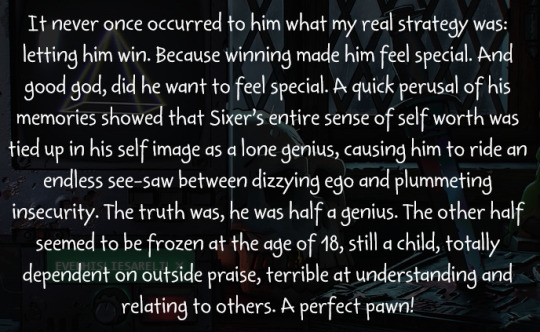
This alone, to me, describes in simple words how it feels to deal with NPD, and though you could argue Bill is projecting here, I think the point is they’re so similar, the lines blur. Both struggle with this same mentality, but Ford is able to reach out, and accept help, and Bill lets himself sink deeper and deeper into his own lies. Also, I’d argue it isn’t Bill projecting, because we sees evidence of this behaviour in Ford in the show and the journal.
He’s someone who believes himself destined for greatness, and won’t accept the bare minimum, such as when Fiddleford suggests he publish his research as is — No, he can’t have that. He has to be the one to uncover this grand theory. He has to have his name cemented amongst the greats. He believes himself to be special, different and more capable than other people, and yet he longs for the company of others all the same. He lives off of validation and praise, and strives for it, his own ego clashing against his lack of self-worth. Bill’s manipulations work on him because Ford eats up this sort of validation — it’s like one big high. It’s confirmation he is special. He is meant for greater things. He was right.
Ford notably struggles with empathy, which is likely both related to his autism, and also his narcissism. Other people simply don’t make sense to him. It takes effort for him to be able to understand people where they’re at, and he is willing to put in that effort notably, taking note of Fiddleford’s habits for example.
He also does struggle with manipulation and being deeply self-centred. A great example being Dipper’s apprenticeship. Ford is very subtly manipulating the situation here, and he doesn’t even notice, which is, in my own experience, common with NPD. He’s also unable to see Dipper and Mabel as, well, Dipper and Mabel, rather putting his own issues with Stan onto them, especially Dipper. He sees Dipper as a younger version of himself, and is trying to point him in that direction, never thinking whether it’s actually right for Dipper, or whether it’s for himself.
I could probably go on, like how he tends to have a black and white view of people, with his opinions on them easily flicking between extremes as a method of coping, or how he panics at the idea of his life’s work being destroyed, despite knowing the dangers.
Whether you agree he has NPD or not, Ford definitely has a lot of narcissistic traits, and yet, despite that, despite every mistake he’s made, everyone he’s pushed away, he gets a second chance. He gets to be loved and understood. He finds happiness. He gets to recover.
It’s very rare that characters with so many narcissistic traits get endings like that!
Ford is not a bad person because he’s a narcissist, he’s just a person, one who’s fucked up, and who’s still learning, and still healing, and that’s why he works. That’s why he’s such a comfort.
On a final note, If you are someone who’s going to argue vehemently against this idea, I kindly ask you simply scroll by!
#gravity falls#gravity falls meta#stanford pines#ford pines#Ford is simply so neurodivergent. he’s on that grind I fear.
257 notes
·
View notes
Text
the book of bill all but spells out that ford's "ego" is a front he uses to overcompensate for a fucked-up smorgasbord of self-esteem issues and insecurities and people will still post shit like "ford is so inhumanly selfish he totally didn't even care about the apocalypse plot, he was only upset about bill's betrayal because it meant he wasn't as special and perfect as he thought"
but anyway to make a larger point here the problem with the interpretation that ford is just a horrible person is that it actually causes a lot of his actions to not make any sense.
like, why is he thinking "i'm sorry fiddleford" when he hasn't seen or heard from fiddleford in three decades? why does he invite stan to play d&d&md with him? in lost legends, why did he try so hard to help stan prove his innocence? in college, why did he immediately stand up for fiddleford, who was at this time a stranger to him? why did he try to make friends in gravity falls at first? why did he try to protect those kids from the krampus? why did he rage against the northwest family after finding out what they did?
multiple different interpretations of a story can be valid but like, the franchise canon has repeatedly shown that ford will be kind and principled in situations where he stands to gain absolutely nothing from it. if he really is so deeply selfish and egocentric that he would willingly and knowingly bring about an apocalypse just so he can be "special," WHY would he do that?
every "ford is a bad person" argument absolutely falls apart under scrutiny because of the sheer amount of cherry-picking and mental gymnastics you have to do to reach that conclusion.
#piss on the poor media literacy#gravity falls meta#sorry i just saw an incredibly stupid post 😭#stanford pines#ford pines
391 notes
·
View notes
Text
The S.S. Cool Dude breaks my fucking heart. And confuses me.

Soos owns a boat. A boat he BUILT!! Or at least, did a lot of repairs on himself. Everything about this boat screams homemade. The different metal sheets on the hull, the red part that looks like the cab from a tractor, the random headlights on the top, the chain steering wheel. Soos is a handyman, so this makes sense.
But I have to know if Stan was involved in this. I feel like he had to be? It's too much of a coincidence.
If this is something Soos did on his own, without any ideas, input, or help from Stan, how did Stan feel about it? He certainly knew about it, even if he didn't say anything. Did he ever think, wow this kid is just like me? Did he want to help? Did he stay away because it reminded him of his brother and it hurt too much? Did he listen to Soos at work excitedly talk about the progress he was making on his boat and have to pretend not to care?
If this was a project that Stan and Soos did together, first awww!!! But second, what happened? If that's the case then the vibes are definitely off in the episode... Stan didn't ask Soos to come fishing with him and the kids? Didn't ask to use the boat they built together? Soos was just, also at the lake?
Plus, in the end, the S.S. Cool Dude is completely destroyed. For seemingly spending a long time buying parts, repairing the boat, and paying for a spot to dock it, Soos really doesn't seem upset about it getting destroyed. He's just excited to get in Stan's little boat and spend time with him.
Personally, I think this is probably what happened:
Young Soos heard Stan tell a few vague stories about fixing up a boat as a teenager and dreaming about going to sea, and maybe even hunting monsters.
Soos wants to spend more time with Stan, and make him proud, so he starts working on a boat himself. Stan helps for a while, things are going good. But something happens and Stan can't take it anymore. It hurts too much. It was supposed to be him and Ford. So, Stan quits. Says he's too busy or something. Soos continues to work on it, and spends time at the lake when he can.
Soos is at the lake on opening day, like the rest of the town, and spots Stan and the kids, talking about a monster hunt and offers up his boat, maybe hoping Stan would come along. The kids agree, but Stan stays behind. Oh well, maybe if he catches a monster Stan will be impressed?
We all know how the monster hunt ends, but that's not important. Soos doesn't care about the Gobblewonker, or that his boat is destroyed. The kids are with him now, and they want to spend time with Stan. And so does Soos. So, he gets to. He gets to fish with Stan on a boat, which is all he really wanted anyway.
#gravity falls#soos ramirez#stanley pines#grunkle stan#mabel pines#dipper pines#headcanon#legend of the gobblewonker#gravity falls meta
190 notes
·
View notes
Text
It really is SO funny (and meaningful, actually, if you think about it) to me that Stanley was the only member of the Pines family who was never able to be manipulated by Bill.
Stan's paranoia and distrusting attitude served him in the best way possible. Yeah, it sucks that he was basically cut off from forming lasting positive relationships up until he moved into Ford's shack in Gravity Falls, but MAN, that was kind of a small price to pay when you realize he unknowingly kept himself protected from one of the most dangerous entities in all of space-time by having that mindset and keeping his walls up all those years.
Can you imagine how fucking disastrous things could've turned out if Bill had gotten to him? Successfully infiltrated Stan's dreams, utilized his connection to Ford to his devious advantage as a bargaining chip, and used Stan for all he's worth to orchestrate Weirdmageddon his way? Ford spent 30 years hiding from Bill, constructing the quantum destabilizer, and putting all his energy into taking him out - to prevent him from meddling in the lives of those he cares about and to protect the world from his evil.
But it turns out, all you really have to do to foil Bill is just... not be swayed by him in the first place. There was NO combination of words in the human vocabulary Bill could have said to get Stan on his side at any point in the story, and tbh that's fucking hilarious.
Get fucked little man, you got outsmarted by the '''lesser''' twin, and he didn't even have to put any effort into it at all.
(And as the icing on the cake, he wrecked your sorry ass too. Smashed you to smithereens in one second flat.)
Truly tho, I think Stan is Bill's match. His equal opposing force. The yin to his yang. Essentially, when put together, they cancel each other out, lmao.
And I just know Bill will be forever haunted by that old man. He can make all the pitiful attempts to reach out from the Theraprism all he wants, but even if he were to escape someday, somehow, there is no coming back from that level of pure humiliation. 🤣
#gravity falls#gravity falls meta#bill cipher#stanley pines#stan pines#grunkle stan#bill and stan#the book of bill#even tho i don't fully subscribe to the same coin theory#i totally get where it's coming from#and it really does have a lot of merit#cuz look: idk whether the writers of GF intended it or not but bill and stan really are SO similar#but the biggest difference between them is stan's love for his family is his strength#whereas bill's connections to ppl he has loved (see: his family and ford) inevitably became corrupted#bc he doesn't know how to love properly#so he's uncontrolled and toxic and destructive and it led to his downful#compare that to stan whose love and devotion to/for his loved ones motivated him and kept him grounded & focused#and allowed him to succeed#stan is success and bill is failure#two parts of a whole narrative#two valuable lessons#one is an inspirational and educational story abt love#the other is a cautionary tale#you feel me?#my posts
412 notes
·
View notes
Text
Okay so Stan getting kicked out WAS NOT FORD'S FAULT and I'm tired of people blaming him for it. It was Filbrick's fault for actually being the one to kick Stanley out. Ford was only at fault for being a fucking teenager and listening to authority around him and internalizing that shit (kinda).
After Stan is kicked out, I think Filbrick spun it so that not only was it a good thing that Stan was gone, but that it was justified. The little he'd say about it was that Stan was never going to amount to anything and that he was just dragging Ford down, so thank God he's gone.
And though it hurt, I think Ford tried to internalize that (and mostly failed). He tried to tell himself it was justified because if it wasn't then what happened was horrible. And he did nothing to stop it. (He wouldn't have been able to stop it anyway.)
It's basically him wallowing in guilt and using "no, this was justified" as a really, reeeeally bad defense that he clings to for years and years afterward, to the point of him even saying so in the journal. He clings to it hard, and it's only after Stan's sacrifice in Weirdmageddon that he's able to finally go ".......no wait".
Like, without Filbrick (and later Bill) constantly telling him that it was justified, and a good thing, and don't worry about him he's FINE, I think Ford would have forgiven Stan on his own WAY earlier. It might have taken a few years, but it wouldn't have been over a decade.
And Bill never would have been able to tell Ford it was justified if Filbrick hadn't done that first.
#gravity falls#gf#ford pines#stanford pines#stan pines#stanley pines#filbrick pines#bill cipher#fuck filbrick pines#gravity falls meta#gravity falls analysis#dimond speaks
200 notes
·
View notes
Text
I'd like to propose a dark horse candidate for the most interesting line in The Book of Bill. And it's this near-unreadable, seemingly one-off joke from the "Skin" page:

[ID: tiny text reading: "Help! This is not Bill Cipher. My name is Grebley Hemberdreck of Zimtrex 5. I'm one of thousands of beings Bill has devoured over trillions of years whose souls are now trapped inside him. You have to free me! It's horrible in here. He just keeps playing the song "Good Vibrations" by Marky Mark on an endless loop. Please, please, this is not a joke! The Zimtrexians were once a proud and mighty people, but now our spirits long for release from this..." End ID.]
Okay, so Bill devours souls who then live out a horrible existence inside him. That's just some typical and expected Bill behavior, right? Nothing to be shocked by? Maybe not, but one thing jumps out at me... and of all things, it's the way that Bill keeps playing that Beach Boys parody (correction provided by @fexalted: no, not in fact a Smiley Smile parody, but a real song!) on loop.
Because in The Book of Bill, there's a recurring motif of characters playing music for a very specific reason: to repel an unwanted presence inside their head. This is what Elias Inkwell, and later Ford, did with the "It's A Small World" parody — they tried to keep Bill out of their brains. Or, metaphorically... to drown out his voice.

[ID: a Journal 3 page with a cassette taped inside. It's titled: "The World Is Small Ever After for Always." Ford writes: "If it's war you want, it's war you'll get! If you want to torture me? I'll torture you back!" End ID.]
That doesn't necessarily mean that Bill finds the voices of devoured souls to be troubling, let alone downright haunting, does it? Well... not quite on its own. But there's a "color" code on the page about TV static that says a lot:

[ID: a code consisting of colorful squares, translated to letters that spell out: "he never sleeps he never dreams but somehow still he hears their screams." End ID] (screenshot courtesy of @fexiled)
The context of the page implies these "screams" come to Bill especially when he listens to TV static, and the broader context of the book implies that these are the screams of his destroyed home dimension, Euclydia. Therefore, not necessarily those of the souls he devoured, from Zimtrex 5 and possibly other dimensions.
Except... do those two things really have to be mutually exclusive?
The beings that Bill devoured were accumulated over "trillions" of years, plural, according to Grebley. In Weirdmageddon 1, Bill claims to have resided in the Nightmare Realm for precisely "one trillion" years. So the "devouring" habit probably extends back even further than his time in the Nightmare Realm...
Enter @acetyzias, pointing out a very conspicuous word — and one of the only uncensored words — from Bill's description of destroying his home dimension:

[ID: the word "mandibles". End ID.]
Oh, and how does Bill describe the "monster" that destroyed his home to Ford, when Ford asks about revenge?

[ID: Journal excerpt reading: "Sixer, it would eat you alive." End ID.]
For a long time, Bill's destruction of his home has been associated with fire, even when the story's told by Bill himself. But through the way the book characterizes Bill's guilt — and characterizes how the consequences of what he's done remain lurking deep inside him — I think The Book of Bill lays out the hints for another motif: devouring.
And, well, when it comes to how Bill destroys things... it wouldn't be without precedent.

[ID: screenshot of Bill in Weirdmageddon 3, taking a bite out of the Earth. End ID.]
#gravity falls#the book of bill#bill cipher#gravity falls theory#gravity falls meta#gf spoilers#the book of bill spoilers#gravity falls spoilers#tbob spoilers#book of bill#long post#mandibles theory
2K notes
·
View notes
Text
one thing i've noticed since being in the gf fandom is there seems to be some kind of implied line separating fiddleford/ford as a "good" ship and all other ford ships as being "bad" ships. by this of course i mean some implication that the "bad" ships are abusive or problematic in some way, while fiddleford/ford is the more wholesome alternative.
in terms of tension and drama, i've seen mostly things like how bill messed with them, the fallout from fiddleford's trip through the portal, fiddleford's affair, the ending of their partnership, their reunion after ford comes home and sees what fiddleford has done to himself.
but what i've seen scant of is fallout from fiddleford using the memory gun on ford.
in TBOB, bill focuses most of his energies on using physical abuse, manipulation, humiliation, and fear to torment ford. but at the end of it, his great big show of force, his biggest threat, is to delete ford's memories:


what does this imply about either the rules of the show or of ford's own feelings? is the messaging we're meant to get from this that, compared to physical and emotional abuse, the rules of the GF universe state that losing your memories, your identity, yourself is worse? or did bill make this the ace up his sleeve because ford thinks it's worse?
and why would ford think it's worse?


and what's so striking to me about this is that, despite all the bad bill does to ford, despite the fact bill invented an entirely new form of domestic violence specifically to get ford to listen to him, bill did not follow through on the threat. but fiddleford did.
so much of ford's life has been characterized by loss of autonomy and loss of choice: stan kept him from WCT, filbrick got rid of stan, bill chose the direction of his research, stan pushed him through the portal, bill created the environment for ford and stan to reunite. and needless to say, of course, all of bill's non-consensual possession of him for countless weeks, to the point ford had to begin to self-harm just to keep him at bay.
and now ford has to contend with knowing that his life, his story, his personhood aren't his either? his vision of the world and himself has been molded by what bill and fiddleford needed him to be in order to serve their goals.
i'm not trying to say fiddleford is as bad as bill, not even close. but i do want to (heh) muse on how i've noticed fiddleford/ford gets this rose tint placed over it.
it can be argued that fiddleford erased ford's mind because fiddleford thought it was for the best, that he truly had good intentions. just look at how the society of the blind eye talk about their work in the show!
but bill also had "good intentions." he and the henchmaniacs were all going to not only die but be wiped out of existence. it can be argued the abuse he inflicted on ford was self-defense!
intention over outcome, i suppose.
the central theme is the same: both of them were another in a long line of people violating ford's autonomy, making decisions for him, taking away pieces of his life.
and, well, bill only threatened it, didn't he?
#gravity falls#gravity falls meta#stanford pines#ford pines#fiddleford mcgucket#bill cipher#i dunno i dunno i dunno#been thinking about this all night
377 notes
·
View notes